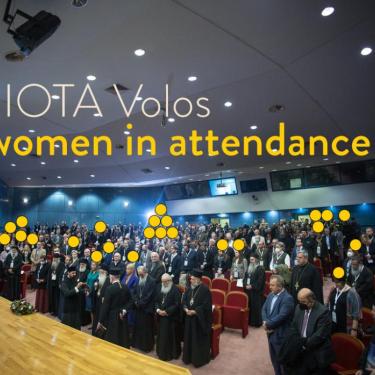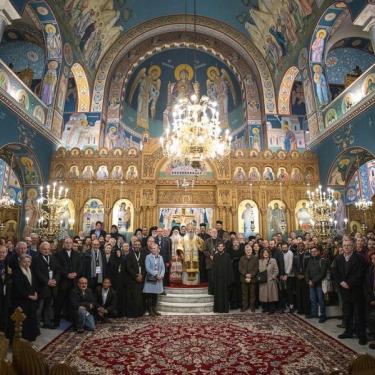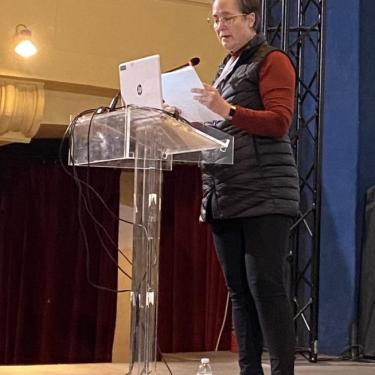
I spend a lot of time working with women at Axia, and thinking about women’s issues, and looking at Orthodoxy through my own eyes and those of the women in our network. And when I go to liturgy, I find myself in parishes whose membership is at least half women and girls. So attending the International Orthodox Theological Association’s mega-conference in Volos, Greece, was a bit of a shock, however much I had been expecting it. I already knew that less than a quarter of its 450+ attendees would be women. Most of the people attending were theologians or other church scholars, and a large proportion wore cassocks. Nonetheless, it all was hugely impressive: there were something like six events running simultaneously throughout the day, over four days, at a wide variety of venues throughout the town.
The Women in the Orthodox Church Group presented three panel sessions (I was fortunate enough to be on the committee that considered which papers to accept).
One panel, which I chaired, was titled Women’s Health: Mind, Body, and Spirit. It included papers from Dr. Ashley Purpura, an American theologian, spoke about the spiritual values of kenosis, subordination/obedience, humility, and sacrifice/martyrdom which can both evidence holiness but also be the justification for perpetuating unhealthy relationships (even toward oneself) and abusive situations. Prof. Auli Vähäkangas, a Finnish Lutheran anthropologist, spoke of the vital and recognized roles that women in the community she studied play in deathbed and cemetery rituals. and Dr. Eirini Afentoulidou spoke about the history of prayers used in churching mothers after they’ve given birth, showing both that there are troubling wording around impurity, but also that they leave aside assumptions about how the woman might actually feel about giving birth and adjusting to motherhood.
A second panel concerned Women and the Mission of the Orthodox Church, especially in the 35 years that followed a church conference on whether women should be ordained to the diaconate. This was co-sponsored by St. Phoebe Center for the Deaconess, and chaired by Dr. Carrie Frederick Frost. Dr. Luis Sales, an American theologian, made two proposals: that we need to stop pretending that the seventh-century Maximus the Confessor, despite his extraordinary holiness, would somehow be any kind of a feminist, plus that we need to address the structural androprimacy of his thought (and that of the bulk of Orthodox thinkers) so that we can realize an Orthodox vision that values women to the same degree that it does men. Dr. Teva Regule (who is well known to Axia’s community as an American liturgical scholar) spoke of the Rhodes 1988’s acknowledgement that the order of the deaconess was never altogether abandoned by the Church and should be revived to meet contemporary needs and demands. Based on what I’ve learned through the wide variety of women I’ve met through Axia, my own paper looked at how Rhodes 1988 both encouraged the revival of the order of the deaconess and effectively scuttled it as a movement, but how women have stepped into vital but unacknowledged diaconal roles in ever-increasing numbers in ways that have had huge benefits throughout the Church. (In one of the most moving moments of the conference as I experienced it, Regule described the effect of ordination on both the ordinand and the Church, creating an intertwined relationship of great beauty and spiritual affect.) Ms. Zipporah Mwuara, who has the status of being the only Kenyan Orthodox woman theologian, spoke of her survey of 100 Kenyan Orthodox women, 10 priests, 10 church leaders, and 10 young mothers, which showed how women are working to find solutions to grievances, to encourage grassroots spirituality, to reassess their participation in the mission of the Church, and alert the global Church to their concerns.
At one point I remember being asked our thoughts about what we might advise for the Church. I attended two church councils in the US this summer and the two overarching themes were: we don’t have enough priests for our parishes, and in fact there are parishes that haven’t had a priest in a long time and that’s not going to change any time soon. And our children would rather be on their phones than go to church. I promise you that if our children’s spiritual and pastoral needs are being met, they won’t be staring at their phones. But who’s going to meet their pastoral needs if we don’t have enough priests? I can’t understand why our hierarchs aren’t using every tool at their command to meet their people’s needs, and if that means ordaining deaconesses, they should be doing it.
It was at this point, too, that Dr. Regule walked us what it means to be ordained. It establishes a new relationship within the community, by setting someone apart for ministry in the community and enlivening their gifts by the grace of the Holy Spirit. Their service is tied to the Eucharist, liturgy, and altar as the source and summit of their ministry, and they themselves connect the liturgy of our lives to the sacramental life of the Church. She emphasized that ordination also sets up a reciprocal relationship between the Church and the person who is ordained, since ordained people is granted/carries the aurhority (and support) of the Church, but then is accountable to the Church (through her bishops).
The Book Review Session on Women in the Orthodox Church was chaired by Ms. Rachel Contos (an Axia board member currently on leave of absence), and featuring Dr. Carrie Frederick Frost, Prof. Paul Ladouceur, Dr. Brian Butcher, and Dr. Niki Papageorgiou. The books that should have been under consideration were Deaconesses, the Ordination of Women and Orthodox Theology (ed. Vassiliades et al.) and Women and Ordination in the Orthodox Church (ed. Narinskaya and Thomas). The session seemed rowdy and unsatisfactory to some in the audience, but unremarkable to others: several men dominated during the question-and-answer session, interrupting each other and the panelists that in other contexts would have been unacceptably disrespectful.
Axia hosted an hour-long women’s get-together. Around 25 women attended, about half of whom were comfortable with this kind of women-only event, and others seem to come out of a kind of fearful curiosity, wondering (perhaps) if we were there to plot the overthrow of the patriarchy (which would have been a lot to ask of a one-hour meeting!). We occupied the time very simply, by having each women introduce herself and her area of expertise, and why she had wanted to join us (one woman mentioned that she was looking for a space free of mansplaining, which allowed her to introduce the term and its history to non-native English-speakers who hadn’t heard it before, but grasped the concept immediately!).
As Axia has the status of “IOTA Co-Laborer,” I joined the heads of other such organizations in giving a short presentation, in my case about Axia’s activities and why we do what we do, in the hopes that Orthodox women in other countries might consider creating similar networks, in the service of Christ.
One of our partner organizations, St. Phoebe Center for the Deaconess, also had a strong presence at Volos, and made a strong showing of (non-ordained) diaconal activity. They not only co-sponsored one of the women’s panels, but also provided a Friday mid-morning coffee break throughout all the venues of the conference. I also need to give a special mention to Dr. Carrie Frederick Frost, who will soon be stepping into the role of Chair of St. Phoebe, who was one of the key organizers of this mega-conference, an event that had more moving parts than I can easily express, and who played a key role in making sure there were panels devoted to women’s topics, and that Axia was able to hold our own event despite last-minute notice.
The town of Volos is a medium-sized Greek city, which welcomed us warmly even as it had to work hard to accommodate such an influx of visitors. I’m also still absorbing much of what I saw and heard at the conference, its wit, wisdom, and wild moments.


Patricia Fann Bouteneff is president of Axia Women. You see her here speaking at IOTA Volos.


